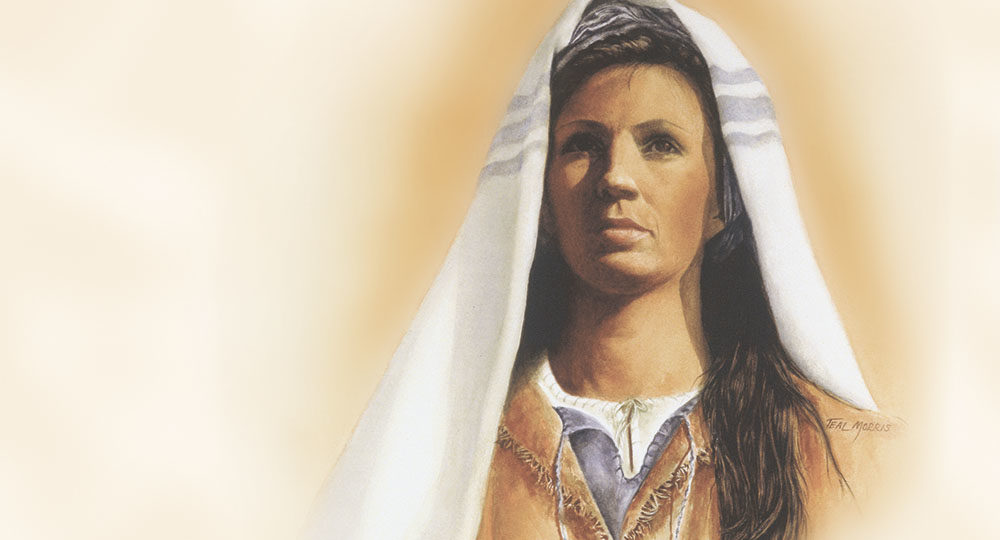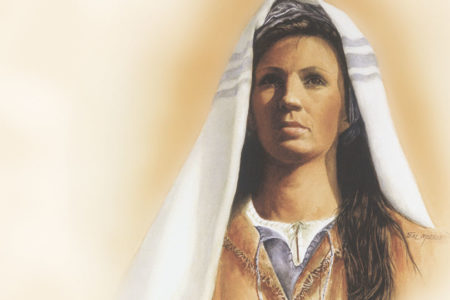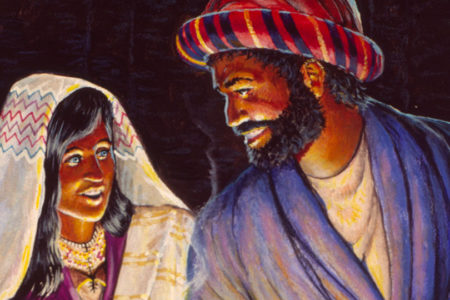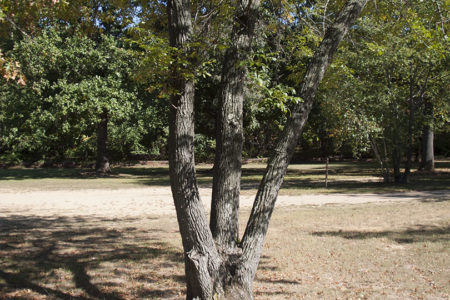Ruth: The Woman Who Wouldn’t Turn Back
Ruth comes to us from the pages of biblical history as a young woman of Moab who married a young man from Bethlehem of Judah. At first glance, it may appear that her husband simply married a beautiful young Moabite, but this marriage should never have occurred according to Jewish Law (Dt. 7:1–11).
As the story unfolds, Elimelech (of the tribe of Ephraim), his wife Naomi, and their sons Mahlon and Chilion left the land of Judah because of a famine and settled in the land of Moab. Following Elimelech’s death, his two sons married Moabite women, Orpah and Ruth. About ten years later, Mahlon and Chilion died. The ancient Jewish sages believed that all three men died as a result of disobedience. Elimelech, whose name means My God Is King, stepped out of the will of God when he failed to depend on the Lord to supply his needs during the famine in Israel. His sons disobeyed the Law of the Lord by marrying women of Moab. All three paid with their lives.
However, God’s plans are never thwarted. Their disobedience set in motion a chain of events that led to a princess of Moab becoming an ancestor of Jewish royalty. Ruth was the great-grandmother of King David, whose family produced Jesus the Messiah. God has a way of turning the wrongs of man into blessings. The flight of Elimelech and his family from Bethlehem to Moab was used by the Lord to build the house of David and, thus, that of the Messiah.
The News From Home
Apparently Orpah and Ruth had grown close to their mother-in-law, and they shared-a common grief. But some decisions had to be made. Following the deaths of her husband and sons, Naomi received word that the famine in the area of Bethlehem had abated, and she decided to return home. Bethlehem, which means House of Bread in Hebrew, was once again blessed with food. Having lost all she had in Moab, Naomi wanted to go back to her land and people. Leaving her husband and sons buried beneath the sod of Moab, the widow prepared to return to her homeland (1:6).
As Naomi made her preparations, Ruth and Orpah declared their intent to accompany her, and the three started out from Moab. Their love for their mother-in-law must have run deep to be willing to go with her to a new and strange country. But Naomi was concerned about the two young women and encouraged them to remain in Moab.
She suggested that Orpah and Ruth returned to the home of their mothers (1:8), which seemed like the rational thing to do. There they could live normal lives surrounded by their own loved ones. Naomi wanted only the best for them (“the Lᴏʀᴅ deal kindly with you,” 1:8) because they had shown great strength and courage, both when Naomi lost her husband and when they themselves became widows. They had been a great comfort to her, despite their own loss.
Naomi also felt that Orpah and Ruth would be able to remarry in the land of Moab (1:9). Of course, she was familiar with the Hebrew system of the kinsman redeemer (a close male relative was to purchase the land of the deceased to keep it in the tribe and marry the wife of the deceased to raise up seed for him), but because the girls were Moabites, she probably thought that the law would not apply to them. Naomi felt that the best place for her daughters-in-law was in Moab with their families; thus, she made a strong plea for them to stay.
Their reaction to Naomi’s suggestion was twofold. First, they both wept. Second, they declared, “Surely we will return with thee unto thy people” (1:10). Naomi had, for now, lost the argument.
Next, Naomi pointed out to Orpah and Ruth that she was beyond childbearing age (1:11). Furthermore, even if she did remarry and have sons, Orpah and Ruth would not want to wait for them to become adults. They would be too old. To go on with-Naomi would put them in a hopeless situation—they would never be able to remarry. She felt that the hand of the Lord was against her, so she again encouraged the two young women to return to Moab (1:13). Thus, as hard as it was, Orpah kissed Naomi and returned home, although not without tears of sorrow (1:14a). “But Ruth clung to her [Naomi]” (1:14b).
Jewish tradition is most interesting concerning what may have occurred next. According to both the Encyclopaedia Judaica and the Jewish Encyclopedia, Ruth, as recorded in the biblical account, went on to become the great-grandmother of King David (4:13–17). Through her marriage to Boaz (a relative of Elimelech who served as the kinsman-redeemer), God blessed her signally. Orpah, on the other hand, returned to Moab, forsook the God of Israel, and worshiped the gods of the Moabites. She is identified with Haratu, the mother of four Philistine giants, one of whom was Goliath.
If this account is true, the story becomes very significant. Orpah and Ruth were probably sisters, daughters of Eglon, king of Moab. Ruth, who wouldn’t turn back, was brought into the kingly line through Boaz, her kinsman-redeemer; eventually, through her descendants, the Messiah was born. Orpah, on the other hand, returned to her country and her gods, and she eventually lost all. Goliath and his sons were slain by David and his men. What a difference one decision made, and what a tremendous lesson it teaches. Although this account is taken from Jewish writings and not the Scriptures, we do know that Ruth was greatly rewarded for her fidelity to Naomi and the God of Israel.
Ruth’s Commitment
Naomi again tried to persuade Ruth to return to her people and their gods, but without success. Ruth was full of grit and determination; nothing and no one could change her mind. Not only did she continue on with Naomi, but she determined to follow her God. There would be no area of separation.
And Ruth said, Entreat me not to leave thee, or to turn away from following after thee; for where thou goest, I will go; and where thou lodgest, I will lodge: thy people shall be my people, and thy God, my God. Where thou diest, will I die, and there will I be buried; the Lᴏʀᴅ do so to me, and more also, if anything but death part thee and me (1:16–17).
The die was cast, the commitment made. There was no turning back. Ruth would not leave her mother-in-law; she would go wherever Naomi went. She forsook her people and now considered herself to be a Jewess. Naomi’s God was now her God, and Ruth resolved to follow Naomi for the rest of her life.
When she recognized the depth of Ruth’s commitment, Naomi stopped trying to persuade her to return to Moab (1:18). The discussion was over, the decision final. Naomi realized that Ruth was fiercely loyal to her and would be faithful to her as long as she lived.
Wouldn’t it be wonderful if people today displayed Ruth’s characteristics? We rarely see such devotion, even in marriages. It is so easy to forget or break promises.
Ruth and Naomi finally arrived in Bethlehem. For Ruth it was a new city, a new experience, a new people, and a new God. For Naomi, however, it was a sad homecoming. She had gone out young, wealthy, and full of promise. She returned old, destitute, and broken. She had no home, no food, no prestige. A few years had made a tremendous difference in her life.
And what a welcome she received! “All the city was moved about them, and they said, Is this Naomi?” (1:19). The people hardly recognized her. Certainly she had aged. Perhaps she was wearing the clothing of a Moabite woman, maybe even clothes of mourning. Her grief had taken its toll.
It was now Ruth’s responsibility to carve out a new path for herself and Naomi. Of course Naomi would guide and help her, but she had to learn a whole new way of life. Also, she would have to eke out an existence for the two of them. Because they arrived in Bethlehem around the time of the barley harvest, Ruth decided to gather ears of grain in the fields behind the reapers. From the corners of the fields that were overlooked by the workers, Ruth began to gather the gleanings.
Ruth had made her commitment to Naomi, and she would honor it. Surely, among these strange people, with their unusual customs and a God who was so different from the ones she had worshiped in her youth, she must have become homesick. Gleaning in the fields under the hot sun was a very lowly task. Did she ever consider leaving Naomi and returning home? The geography of the city and fields of Bethlehem made it possible, on a clear day, to look to the east and see the hills of Moab. Gazing in that direction probably brought back memories of Ruth’s childhood and the few happy years of her marriage. Perhaps things would be better in that distant land. As it was, instead of being a Moabite princess, she was a pauper in a strange country. As the hills of Moab beckoned, Ruth was faced with a tremendous challenge and, perhaps, a great temptation.
But she remained faithful to Naomi and true to her new God, the God of Israel. Never would she return to her old land or her old ways.
A little chorus became popular a few years ago—a chorus we should all repeat often:
I have decided to follow Jesus.
I have decided to follow Jesus.
I have decided to follow Jesus.
No turning back, no turning back.
Ruth never sang that chorus, but her life exemplified its message. She determined to follow the Lord—there would be “no turning back.” We should emulate Ruth and practice her example of devotion and allegiance. We need multitudes of Ruths today—people with the courage to stand on their convictions and never turn back.








